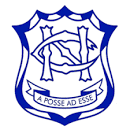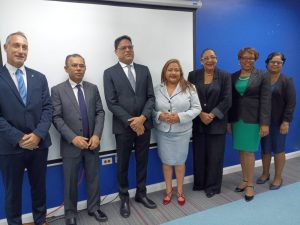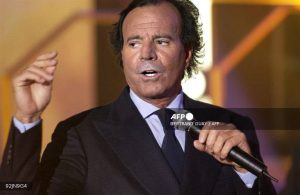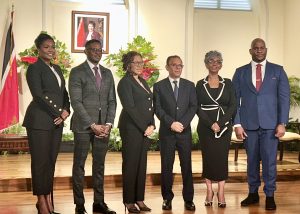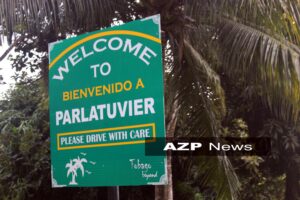
BY 1931 the population of Naparima College was 200 students.
Three years later, the Higher School Certificate began at the college. The Junior and Senior Cambridge examinations allowed graduates to obtain jobs in teaching service, civil service jobs and satisfied entrance examinations to European and United States universities.
Among the buildings constructed were a dormitory, dining hall in 1925, infirmary in 1927 and central part of the “U” layout in 1931.
In 1939, the first Founders’ Day celebration was held and two classrooms originally built in 1917 were replaced by the wings of the “U” structure.
In 1950, at Naparima’s Golden Jubilee (and Rev VB Wall’s 25th year as principal), Trinidad Leasehold Limited, a major oil company, presented a flagstaff as a gift to the school.
A few years later, in 1953, Rev Walls retired and was replaced by the competent Rev Edward T Lute of Toronto. During the first year of Lute’s principalship, a public address system (the Blue Circle Network) was installed in classrooms. In this memorable year, Rev. Lute administered over 640 students.
In 1958, Rev Lute’s “Principal’s Report” for Naparima College in 1958 would have been the envy of other secondary schools. Based on the results of the 1957 examinations, the institution boasted of a remarkable 77% success rate in Higher Certificate examinations and 71% passes of Second Division certificates in School Certificate exams.
Another milestone, was the winning of an Island Open Scholarship by Larry Lutchmansingh, who was the first boy in a school outside Port of Spain to achieve this feat.
This was not the first scholarship for Naparima since three scholars
hips had been previously won by girls attending the college. The principal also revealed that new laboratory facilities which enabled the subjects of Physics, Chemistry and Biology to be offered for the Higher Certificate exams. Two noteworthy features of the college’s extracurricular life were the introduction of The Olympian, the college magazine and the annual Shakespearean Festival.
In 1959, the school’s enrolment was 700. During this year two important events in the school’s history occurred. New steel and concrete buildings were constructed and wood from the old buildings was used to construct gymnasium (which was used until 1995). Secondly, Lute introduced the “house system”. Each student was assigned to a
house—Wall House (red), Sammy House (blue), Flemington House (gold), Grant House (green).
In 1960, Naparima College celebrated its Diamond Jubilee (60 years) with a week of activities including a Thanksgiving Service at Susamachar Presbyterian Church and a tea party. In this year, the progressive nature of the educational institution was obvious.
A building which once served as the college office and the library was converted to a much needed “Student Centre”. This addition had rooms for games, handicrafts and
club/society meetings. There were various non-academic activities such as the Art Club
which met in “The Garret”, the Camera Club and Radio Club. Other groups in existence
included the First Naparima College Scout Group and the Naparima Geographical
Society.
This year was also a milestone since a decision was made to form a student co-operative and open a snack bar (tuck shop).
Secondly, a Volkswagen bus, The Big Blue Ox, was added to the development of the school’s chaplaincy.
In August 1960, ten college students learnt various aspects of vacation school work such as crafts, games and handicrafts. They were trained for the first College Youth Caravan for Leadership and Education (CYCLE) and organised a five-day vacation school at Iere Village in which 65 boys and girls received certificated of attendance.
In 1962, Naparima College had an enrolment of 688 students and like other Presbyterian primary and secondary schools, proudly maintained its strong religious ties.
The chaplain was responsible for conducting worship services in the chapel or school. He also planned and taught classes in Christian teachings.
In sports as in academics, the college was also impressive. During the 1950s, Naparima College participated in football, particularly the Southern Amateur Football Association. in 1973, the school won the national Intercol Football Championship and the Shell Intercol Trophy.
In 1977, the school also won the coveted National Cricket Championship title and holds the distinction of being the first school to win consecutive National Intercol finals whilst in the Senior Division.
Dr Jerome Teelucksingh is an activist. He initiated the inaugural observances of International Day for the Elimination of Violence Against Men and Boys (January 31) and World Day of the Boy Child (May 16). He has made academic presentations at tertiary institutions including Harvard University and Oxford University.
See other articles by Dr Jerome Teelucksingh on AZP News:
An Early History of Naparima College
The Glorious City of Port of Spain
Have we Forgotten George Padmore
Nobody Cares about Underachievement
Can we Eradicate Underachievement?
A Quiet Pandemic: Male Underachievement
The Blackest Thing in Slavery wasn’t Slaves
The Importance of Emancipation Day
Tobago’s Working Class in the 1920s, 1930s
Are Humble Caring Fathers Champions?
Influencing West Indian Masculinity
Defining Caribbean Masculinity
Is Monogamy Encouraged in the Caribbean
Naps Girls: From Humble Beginnings to Excellence
US Media Creates Cultural Dependency in the Caribbean
Bloodless Revolution to Save Lives in Developing Countries
The Need for a Social and Moral Revolution
The Law of Supply and Demand in Developing Countries
End the Dependency for Developing Countries
T&T Carnival and the Emperor’s New Clothes
The Influence of Labour on Caribbean Integration
The illusion of political Unity
Presbyterians in Trinidad: Humble Missionaries, Local Workers
Religious Plurality: Curse or Blessing
Caribbean Youth Need Optimism, Patriotism
Rethinking Identities in Caribbean, Latin America
November 19: All Inclusive International Men’s Day
Should International Agencies be Blamed for Unemployment
A Need to Observe Word Unemployment Day
An Ideology for the Trade Union Movement
The Man who Couldn’t be Prime Minister
Social Outburst vs Social Revolution
Challenges of the Men’s Movement
If George Floyd was Denied Parole
The Meaning of Indian Arrival Day in T&T
International Men’s Day – A Way of Life
Wounds that cause school violence
May Day: A Time for Solidarity, Strength
Who Coined the Term ‘Black Power’
The illusion of political Unity
Presbyterians in Trinidad: Humble Missionaries, Local Workers
Religious Plurality: Curse or Blessing
Caribbean Youth Need Optimism, Patriotism
Rethinking Identities in Caribbean, Latin America
November 19: All Inclusive International Men’s Day
Should International Agencies be Blamed for Unemployment
A Need to Observe Word Unemployment Day
An Ideology for the Trade Union Movement
The Man who Couldn’t be Prime Minister
Social Outburst vs Social Revolution
Challenges of the Men’s Movement
If George Floyd was Denied Parole
The Meaning of Indian Arrival Day in T&T
International Men’s Day – A Way of Life
Wounds that cause school violence
May Day: A Time for Solidarity, Strength
Who Coined the Term ‘Black Power’
![]()


